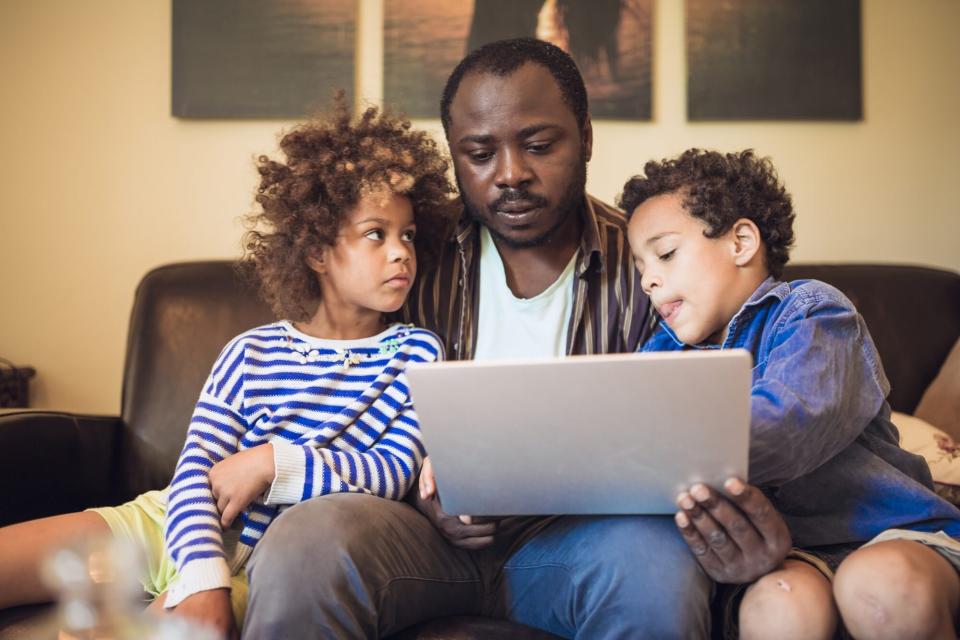The Do's and Don'ts of Talking About COVID-19 With Kids

It's easy to understand why you may want to avoid talking about scary topics—such as the coronavirus—with your kids. Every parent wants to protect their children from avoidable anxiety. But when it comes to the spread of COVID-19, kids probably already know more about it than parents realize, thanks to social media and constant news reports, says media psychiatrist Carole Lieberman, M.D. And unfortunately, a lot of what they're hearing may not be accurate or up-to-date.
Just as with other heavy topics, it falls on parents to discuss the coronavirus with their kids in a way that eases worry, promotes knowledge, and stops the spread of misinformation. Here are some tips for starting the conversation.
Do Keep Them Informed
Having an incomplete picture of COVID-19 can create unease, especially in kids. Clear up the rumors by being an open, honest source of information. You can explain COVID-19 and its origins, then let kids ask questions. This comic-style diagram from NPR might help spark conversation.
And be cautious of letting kids consume media without you: "Everyone should be cautious of the sensational media 'hooks' employed to draw eyes, ears, and clicks to news stories about the coronavirus," advises Charles Bailey, M.D., medical director for infection prevention at St. Joseph Hospital in Orange County, California. "Kids, in particular, should probably not be consuming such information without an adult present to provide an age-appropriate context and filter out the more anxiety-provoking content."
Don't Become an Alarmist
Kids are sensitive to the anxiety of the adults around them, says pediatrician Dyan Hes, M.D., founder of Gramercy Pediatrics. So even though you might be worried about the unknowns and unanswered questions regarding COVID-19, try to keep things optimistic for your child. For example, you can say, "Kids like you are less likely to get really sick. And if you do get sick, it'll probably just be like a bad cold."
Do Use Age-Appropriate Language
Little kids don't understand the words quarantine and transmission, but you can still talk about the coronavirus with them. "Use lively terms like germ and bugs and incorporate animated pictures. Also use very concrete language about how boogers or spit can cause germs to pass to one person or the next," suggests Rosemary Olivero, M.D., division chief for pediatric infectious disease at Helen DeVos Children's Hospital. "Kids also remember their own illnesses, so referencing those salient examples can be really helpful."

NoSystem images/Getty Images
Don't Make a Big Deal Out of Precautionary Measures
Whether it's wearing masks in public or meticulously wiping down the handle of the shopping cart at the grocery store, you're probably still taking a number of precautions in your everyday life that you may not have before the pandemic.
By now, many of these precautions may be normal for your kids, but as expert recommendations evolve and behaviors change, try to keep your attitude neutral, even positive. If your child asks about why you're doing something new or different, simply say that you're trying to keep everyone safe and healthy.
Do Talk About the Progress That's Been Made
Tell your child about everything that's being done to combat COVID-19, from new research to vaccinations, says Andrea Barbalich, parenting expert and newly appointed editor-in-chief of The Week Junior.
While there's still a lot we don't know about COVID-19, we know much more than we did when the coronavirus first arrived. We also have more tools. We have vaccines to help prevent people from getting really sick and better treatments if they do get sick. Knowing that your family has a plan—and the country does too—might ease your child's worries.
Don't Ignore Proper Hand Hygiene
One way to prevent getting sick from COVID-19 is to maintain proper hand hygiene, so be sure to talk about what that looks like. "Teach your children how to wash their hands using soap and water for at least 15–20 seconds, or how long it takes to sing the ABCs," recommends Robert Frenck, M.D., medical director, division of infectious diseases at Cincinnati Children's Hospital. This is especially important before eating or touching your face because virus- and bacteria-laden droplets can enter your body through the nose, eyes, and mouth.
While you're at it, teach your children to cough into their arm, throw away used tissues right away, and wipe down communal items (like keyboards) before use. Limiting exposure to germs can help keep your entire family healthy.

